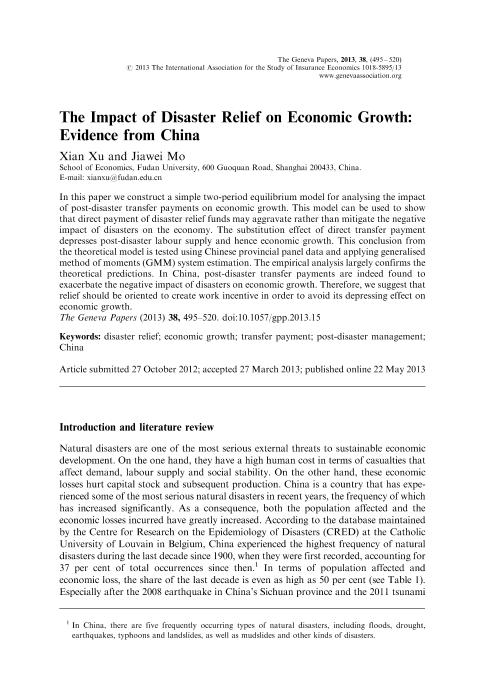The Impact of disaster relief on economic growth : evidence from China

Contenido multimedia no disponible por derechos de autor o por acceso restringido. Contacte con la institución para más información.
| Tag | 1 | 2 | Valor |
|---|---|---|---|
| LDR | 00000cab a2200000 4500 | ||
| 001 | MAP20130022925 | ||
| 003 | MAP | ||
| 005 | 20130920150248.0 | ||
| 008 | 130725e20130701esp|||p |0|||b|spa d | ||
| 040 | $aMAP$bspa$dMAP | ||
| 084 | $a328.1 | ||
| 100 | 1 | $0MAPA20130009896$aXua, Xian | |
| 245 | 1 | 0 | $aThe Impact of disaster relief on economic growth$b: evidence from China$cXian Xu, Jiawei Mo |
| 520 | $aIn this paper we construct a simple two-period equilibrium model for analysing the impact of post-disaster transfer payments on economic growth. This model can be used to show that direct payment of disaster relief funds may aggravate rather than mitigate the negative impact of disasters on the economy. The substitution effect of direct transfer payment depresses post-disaster labour supply and hence economic growth. This conclusion from the theoretical model is tested using Chinese provincial panel data and applying generalised method of moments (GMM) system estimation. The empirical analysis largely confirms the theoretical predictions. In China, post-disaster transfer payments are indeed found to exacerbate the negative impact of disasters on economic growth. Therefore, we suggest that relief should be oriented to create work incentive in order to avoid its depressing effect on economic growth. | ||
| 650 | 4 | $0MAPA20080590291$aDesastres naturales | |
| 650 | 4 | $0MAPA20080600648$aCrecimiento económico | |
| 650 | 4 | $0MAPA20080580865$aImpacto ambiental | |
| 650 | 4 | $0MAPA20080612429$aRiesgos extraordinarios | |
| 651 | 1 | $0MAPA20080644178$aChina | |
| 700 | 1 | $0MAPA20130012520$aMo, Jiawei | |
| 773 | 0 | $wMAP20077100215$tGeneva papers on risk and insurance : issues and practice$dGeneva : The Geneva Association, 1976-$x1018-5895$g01/07/2013 Volumen 38 Número 3 - julio 2013 , p. 495-520 |

